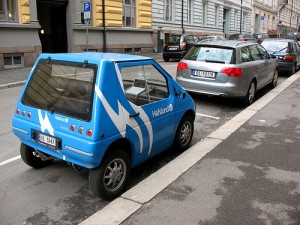Electric Cars Are Key To Sustainable Future
There are thousands of Americans waiting and wanting to be a part of the technological evolution of the electric car industry, like the Nissan Leaf and the Chevy Volt. This desire has not been seen since the start of the industrial revolution, when humans changed their steam engines for electric motors. The people who began to utilize the most innovative technology are rapidly on the road to a future with clean air and a reduced dependence on the petroleum industry. They are investing their technological resources at a critical time in history and all of us benefit from their actions.
It isn’t a secret that the first generation of new technology is extremely costly. My uncle, a true engineer, took over one of the first basic calculators in 1971—the Busicom Handy-LE—and confirmed that emerging technologies come with precious components: the actual cost of the calculator was well over $2,000. Today, these mini-calculators are given away at promotional events.
I am not suggesting that the future will bring free electric cars for everyone, but rather that they will improve in automotive performance while diminishing in cost. What’s more, we are already witnesses to some of this progress. The example mentioned below shows the performance of lithium-ion batteries from 1991 to 2001 (the blue line represents the EMF of watt per liter), which power electric cars today—and how they multiply in quantity—while their respective prices dropped ten-fold (the green line represents the price in dollars per each watt-hour)
The Nissan Leaf and the Chevy Volt go for US$35,000 and $40,000, respectively. They aren’t cheap but they are affordable considering they are first-generation electric cars. The price can be further lowered if you take into account the federal rebate of $7,500 in tax credits among other governmental support.
Many of us, including me, aren’t able to acquire a new electric car at these prices but I am grateful that there are people who are buying them already because they are supporting a clean future for all of us. The drivers of electric cars are helping the rest of us. The decision to drive with electricity means that they emit—on average—four times less carbon dioxide than traditional cars. The benefits increase when more electric cars are bought and more renewable electricity is added to the network.
Electric cars also reduce smog and contamination around roads and highways that contribute to dirty air.
Drivers of electric cars today are not simply altruistic. Many are motivated by convenience in that they are able to charge their cars in front of their homes and the fact that driving these cars costs approximately $1 per gallon. It is what it is, and this motivation is creating an extremely interesting market. Between 35 and 40 electric models will be introduced in the coming years. While electric cars have many benefits, they are not a cure-all. We need a comprehensive plan in policy and technology that will maintain a competetive market in the United States, reduce the need for petroleum, and protect the environment. This past week, President Obama announced an agreement for 2025 that enforces standards for carbon levels and fuel efficiency of 54.5 miles per gallon for cars and trucks.
My colleague Roland Hwang determined the importance of the presidential decree: “We all win with this new agreement–not just the drivers and the auto industry workers, but rather the whole society: men, women, children, and all people can breath clean air.” As this document here explains, the health benefits according to previous standards have exceeded the costs of controlling emissions by 100 to 1. Our work does not end here.
We still need investment in public transit, as my colleague Deron Lovaas explained. Moreover, we need to plan–intelligently–urban spaces and regions to be able to foster sustainable communities according to the suggestions of my colleagues, Kaid Benfield y Amanda Eaken.
There is not a single solution but electric cars make up one critical element of a future where societies depend less on petroleum. Now friends, thanks for your collaboration and for helping us create a clean future for everyone!
[Photo By shannonkringen]

